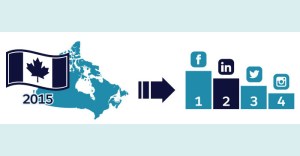If you run a business or you’re in charge of a company’s social media profiles, then you’re probably on LinkedIn. But having a presence on LinkedIn and having a valuable presence on LinkedIn are not necessarily the same thing.
Whether you want to create or refine your business page, here are several dos and don’ts that will help you avoid common mistakes, maintain proper LinkedIn etiquette, and help your business stand out.
LinkedIn Stats: The Need-to-Know
- There are 347 million LinkedIn users
- LinkedIn reaches 200 countries and territories
- 40% of users check LinkedIn daily
- A 2015 study conducted by Forum Research indicates Facebook is the most popular social network in Canada, followed by LinkedIn, Twitter, and Instagram
- 30% of respondents use LinkedIn
- Canadians visit LinkedIn about twice per week
- The network is most popular with middle-aged Canadians between 45 and 54 years old
- 46% of Canadians that earn $100-$250K use LinkedIn
- 36% of parents with children under 18 have LinkedIn accounts
- A 2015 study conducted by Forum Research indicates Facebook is the most popular social network in Canada, followed by LinkedIn, Twitter, and Instagram
- In a study that looked at social media use by CEOs running the top 50 companies on Fortune’s 2014 Global 500 rankings list:
- LinkedIn was the most popular network
- With 22% of CEOs on the platform, up from just 6% in 2012
- 47% of B2B businesses use LinkedIn
- LinkedIn is the number 1 social network for lead generation

When you realize LinkedIn’s power to elevate brands and build connections, you’ll understand why it’s so important to maintain proper etiquette on the platform. Here are a few compelling stats:
- LinkedIn has 347 million users in 200 countries and territories.
- Among U.S. adults, LinkedIn is even more popular than Twitter: 22 per cent of adult internet users take advantage of LinkedIn, compared to 19 per cent who use Twitter.
- Up to 22 per cent of CEOs from major companies are on LinkedIn.
- LinkedIn is especially popular among B2B businesses, with 47 per cent using LinkedIn.
- LinkedIn can help build brands and boost sales; some sources identify it as the number one social network for generating leads.
Using LinkedIn: The Dos
- Treat your profile like a professional brochure
- Use an appropriate, professional looking profile image
- Make sure all information is up to date
- Provide a detailed description
- Construct a detailed company summary at the top of your business page
- It should tout accomplishments and clearly state what your company does
- Use simple language
- Stick to recognizable terms and language so all levels of LinkedIn users can engage
- Spell check (again and again)
- Continually check for spelling mistakes which could reduce the credibility of your company
- Turn off notifications when updating your profile
- Disable notifications when making updates to your profile
- Continual updates can be a bit annoying to your connections
- Link to valuable video
- Tap into the value of multimedia with meaningful videos that better help consumers understand the services and produts you offer
- Choose groups wisely
- Pick only groups that are most relevant to you
- Check in on groups frequently. If they don’t yield many prospects, consider leaving them
- Be active in groups
- Post relevant and thoughtful responses to discussions
- Pose questions of your own
- Know that LinkedIn isn’t anonymous
- If you’re logged into LinkedIn, users can see when you view their profile
- To look at other people’s profiles anonymously, either:
- Change your “Select what others see when you’ve viewed their profile” setting to “anonymous”
- (just know this disables you from seeing who has viewed your profile)
- Or go log out of LinkedIn and search for the person using Google or another search engine
- Respond promptly
- Try and respond to messages within 1-2 days
- Nurture relationships
- Make an effort to connect with valued connections on a regular basis
- Send valuable content specific to a connection or leave a positive comment, or “congrats,” on a connection’s update
- Keep your contact list open
- Hiding contacts may look self serving

Now that it’s clear why LinkedIn can be a powerful tool for business development, let’s take a look at some best practices for cultivating your LinkedIn presence.
Do: Treat your profile like a professional brochure
If you came across a company brochure that featured low-quality images and out-of-date information, you’d probably be disinclined to solicit that company’s services. The same principle applies to your businesses’ LinkedIn page. If you do nothing else with your profile, include professional imagery and keep everything up to date.
Do: Provide a detailed description
Once people land on your LinkedIn page, you have limited time to convince them that your business is worth their engagement. Make it as easy as possible for readers to understand what your business is about by including a company summary at the top of the page. In this summary, articulate what exactly your company does and include any notable accomplishments.
Do: Use simple language
While LinkedIn users tend to be well educated, that doesn’t mean they’re educated in your particular industry. Make your profile accessible to a broad audience by avoiding industry-specific jargon; use terminology that can be easily understood by everyone.
Do: Spell check (again and again)
Just as professional, up-to-date content is essential for readers to take your business seriously, so too is clean copy. Before publishing your company’s profile information, proofread it, have a colleague proofread it, and then proofread it again. (If you want to be extra circumspect, hire a professional proofreader.)
Do: Turn off notifications when updating your profile
If your contacts get an email notification every time you add a new bit of information to your profile, they’re going to get annoyed. Avoid this by disabling notifications whenever you update your profile.
Do: Link to valuable video
Use the power of multimedia to engage customers and teach them more about your industry, company, and services or products.
Do: Choose groups wisely and maintain an active presence
Avoid the temptation to join every group under the sun; your brand will look desperate and you will have difficulty prioritizing your time and attention. Instead, join groups only if they’re relevant to your business, and maintain an active presence by posting in discussion threads. Evaluate your efforts on a regular basis to see if they yield returns; if not, it may be time to leave the group.
Do: Remember that LinkedIn isn’t anonymous
If you’re logged into LinkedIn, users see whenever you view their profile. If you’d prefer to remain anonymous, log out of your account before searching for a person, or change your settings to make your views anonymous.
Do: Respond promptly
What’s more professional, responding promptly to business inquiries or waiting weeks to respond? We’re hoping you chose the former. A good rule of thumb is to respond to all messages within one or two business days.
Do: Nurture relationships
LinkedIn is a networking site, which means it’s all about relationship building. Aim to connect with your most valuable contacts on a regular basis by sharing relevant content or congratulating them on new achievements.
Do: Keep your contact list open
Sometimes you don’t want your competitors to know about your most valuable connections. But LinkedIn users tend to perceive hidden contact lists as self-serving. Chalk this one up to building a transparent brand and keep the list open.
Using LinkedIn: The Don’ts
- Connect without researching first
- Before you ask for a connection, take the time to learn about a candidate
- Be prepared to explain why they should connect with you
- Default to the standard “Join my network” message
- Show connections you took the time to understand what they are about with a personal connection message
- Some people on LinkedIn may report random requests with the “Report Spam” or “I Don’t Know This Person” buttons
- If it happens a few times, LinkedIn can restrict your profile
- Send spammy messages
- Avoid sales pitches in messages to your connections
- Send messages to multiple people without deselecting
- Personal messages are ideal, but if you want to send a single message to multiple people, deselect the option that says, “Allow recipients to see each other’s names and addresses”
- Post faulty links
- Double check that links aren’t broken or outdated
- Self promote
- Most discussions or links you post should offer value beyond self promotion
- Allow your profile to be stagnant
- Remain active, even if it just means a post or two a week
- Be negative in groups
- Avoid overly critical or negative comments in group discussions
- Treat LinkedIn like Facebook or Twitter
- Get familiar with LinkedIn etiquette and best practices
- Don’t post the same type of updates on LinkedIn as you would on Facebook or Twitter
- Stick to industry news, relevant industry content, and a company update here and there

Just as there are best practices to embrace on LinkedIn, there are also practices to avoid at all costs. Here’s what not to do if you want to make a good impression.
Don’t: Connect without researching first
A LinkedIn connection request is just that—a request for connection, which means your request should be personal. Take time to learn about the person or business, and articulate why they would benefit from connecting with you. Whatever you do, don’t default to the standard “Join my network” message. It looks like you’re not invested in the connection and can even lead to reports of spam if you do it too often.
Don’t: Send spammy messages
When people accept connections on LinkedIn, they don’t do so hoping they’ll get bombarded with sales pitches; don’t be the business that betrays their trust. Messages to your connections should be personal, not generic sales attempts.
Don’t: Send messages to multiple people without protecting their privacy
As mentioned above, personal messages are the ideal way to reach out to contacts on LinkedIn. If you decide to send the same message to multiple people at once, deselect the option that lets recipients see each other’s names and addresses. Otherwise, you broadcast people’s personal information without their consent, and that’s not going to build positive sentiment toward your business.
Don’t: Post faulty links
Remember when we advocated for proofreading before posting? The same principle applies here. Before sharing links, make sure they work.
Don’t: Self-promote
LinkedIn users have a low tolerance for blatant self-promotion. When you contribute to group discussions or share content, make sure to provide value to readers.
Don’t: Let your profile grow stagnant
If you’re going to have a presence on LinkedIn, then you may as well have a presence on LinkedIn. Even short posts once or twice a week can help establish your company as an active voice in your industry.
Don’t: Be negative in groups
Every time you post content or participate in groups, you represent your business. A quick way to harm your company’s reputation is by being dismissive, critical, or otherwise negative when participating in group discussions. To keep a healthy brand reputation, keep things positive online.
Don’t: Treat LinkedIn like Facebook or Twitter
LinkedIn is a unique social platform that’s focused entirely on professional development and networking. Thus, it shouldn’t be treated like an extension of your company’s profile on other social platforms. Instead, focus on sharing industry-related content and the occasional company update.
Conclusion
LinkedIn is a valuable tool for businesses looking to make connections, increase brand awareness, and stay current with industry news. Make the most of this platform by adhering to the above dos and don’ts and establishing your business as truly professional.
Share “LinkedIn Dos and Don’ts for Business” On Your Site


























